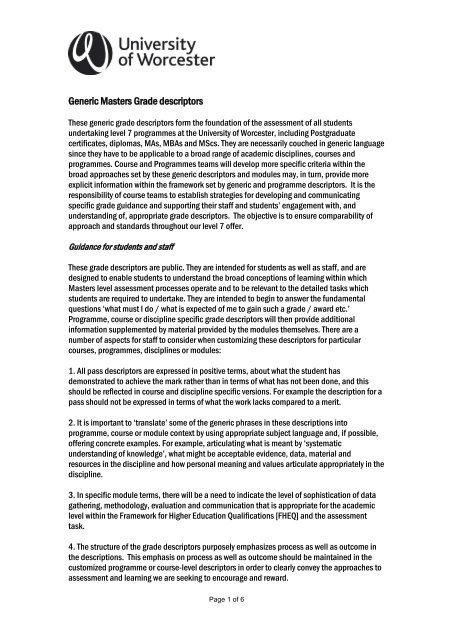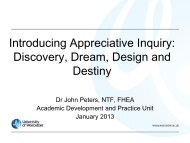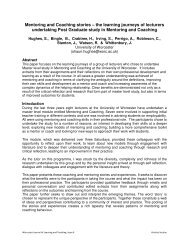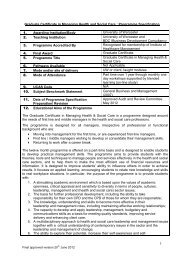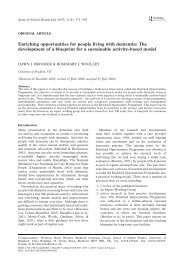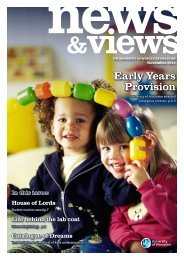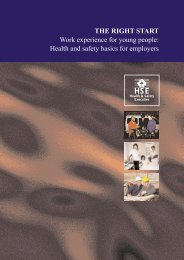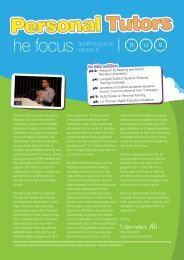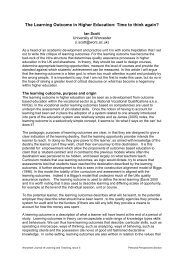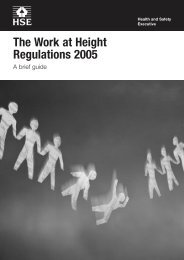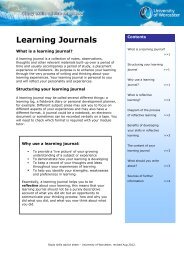Grade Descriptors - University of Worcester
Grade Descriptors - University of Worcester
Grade Descriptors - University of Worcester
You also want an ePaper? Increase the reach of your titles
YUMPU automatically turns print PDFs into web optimized ePapers that Google loves.
Generic Masters <strong>Grade</strong> descriptors<br />
These generic grade descriptors form the foundation <strong>of</strong> the assessment <strong>of</strong> all students<br />
undertaking level 7 programmes at the <strong>University</strong> <strong>of</strong> <strong>Worcester</strong>, including Postgraduate<br />
certificates, diplomas, MAs, MBAs and MScs. They are necessarily couched in generic language<br />
since they have to be applicable to a broad range <strong>of</strong> academic disciplines, courses and<br />
programmes. Course and Programmes teams will develop more specific criteria within the<br />
broad approaches set by these generic descriptors and modules may, in turn, provide more<br />
explicit information within the framework set by generic and programme descriptors. It is the<br />
responsibility <strong>of</strong> course teams to establish strategies for developing and communicating<br />
specific grade guidance and supporting their staff and students’ engagement with, and<br />
understanding <strong>of</strong>, appropriate grade descriptors. The objective is to ensure comparability <strong>of</strong><br />
approach and standards throughout our level 7 <strong>of</strong>fer.<br />
Guidance for students and staff<br />
These grade descriptors are public. They are intended for students as well as staff, and are<br />
designed to enable students to understand the broad conceptions <strong>of</strong> learning within which<br />
Masters level assessment processes operate and to be relevant to the detailed tasks which<br />
students are required to undertake. They are intended to begin to answer the fundamental<br />
questions ‘what must I do / what is expected <strong>of</strong> me to gain such a grade / award etc.’<br />
Programme, course or discipline specific grade descriptors will then provide additional<br />
information supplemented by material provided by the modules themselves. There are a<br />
number <strong>of</strong> aspects for staff to consider when customizing these descriptors for particular<br />
courses, programmes, disciplines or modules:<br />
1. All pass descriptors are expressed in positive terms, about what the student has<br />
demonstrated to achieve the mark rather than in terms <strong>of</strong> what has not been done, and this<br />
should be reflected in course and discipline specific versions. For example the description for a<br />
pass should not be expressed in terms <strong>of</strong> what the work lacks compared to a merit.<br />
2. It is important to ‘translate’ some <strong>of</strong> the generic phrases in these descriptions into<br />
programme, course or module context by using appropriate subject language and, if possible,<br />
<strong>of</strong>fering concrete examples. For example, articulating what is meant by ‘systematic<br />
understanding <strong>of</strong> knowledge’, what might be acceptable evidence, data, material and<br />
resources in the discipline and how personal meaning and values articulate appropriately in the<br />
discipline.<br />
3. In specific module terms, there will be a need to indicate the level <strong>of</strong> sophistication <strong>of</strong> data<br />
gathering, methodology, evaluation and communication that is appropriate for the academic<br />
level within the Framework for Higher Education Qualifications [FHEQ] and the assessment<br />
task.<br />
4. The structure <strong>of</strong> the grade descriptors purposely emphasizes process as well as outcome in<br />
the descriptions. This emphasis on process as well as outcome should be maintained in the<br />
customized programme or course-level descriptors in order to clearly convey the approaches to<br />
assessment and learning we are seeking to encourage and reward.<br />
Page 1 <strong>of</strong> 6
The structure <strong>of</strong> the grade descriptors<br />
The grade descriptions below are set out according to the grade system used at the <strong>University</strong> <strong>of</strong><br />
<strong>Worcester</strong>, and mapped on to the conventional categories or sub-divisions <strong>of</strong> the Masters<br />
degree in British Higher Education. These form a hierarchical system in which categories are, in<br />
some respects, linked to each other, each building on and developing from (and towards)<br />
attainments recognised in other categories. The categories are expressed as a series <strong>of</strong> discrete<br />
steps but, in practice, transitional attainment will <strong>of</strong>ten be evident in students’ work. Work<br />
could, for example, demonstrate attributes <strong>of</strong> both the Pass and Merit categories at the same<br />
time, and the eventual decision as to where to place it would depend on the tutor’s pr<strong>of</strong>essional<br />
academic judgment and the application <strong>of</strong> the moderation process in line with the <strong>University</strong>’s<br />
assessment policy. The complex nature <strong>of</strong> work at this high academic level cannot be reduced<br />
to a clear-cut series <strong>of</strong> mutually exclusive categories and grade descriptors cannot be<br />
interpreted as such. The category descriptions indicate the general characteristics <strong>of</strong> different<br />
types <strong>of</strong> work which lead to their assignment to particular categories.<br />
Learning in Higher Education<br />
Underpinning the various grade descriptions outlined below are a number <strong>of</strong> frameworks and<br />
theoretical models <strong>of</strong> learning in Higher Education. The criteria are informed by the FHEQ, which<br />
set out descriptions <strong>of</strong> the broad learning outcomes students need to demonstrate to achieve<br />
qualifications at the various academic levels and descriptions <strong>of</strong> what typical holders <strong>of</strong> higher<br />
education awards are able to do. The NICATS generic level descriptors provide further detail for<br />
all levels <strong>of</strong> study.<br />
The theoretical frameworks add to these by helping to identify the progression, in terms <strong>of</strong> the<br />
student conception <strong>of</strong> learning in advanced higher education, we are seeking to encourage and<br />
reward through assessment. Broadly speaking this may be characterized as proceeding from a<br />
conception in which, at one extreme, learning is about acquiring, collating and reproducing<br />
value-free, factual information and expert opinion through to the other extreme where learning<br />
is a process <strong>of</strong> self-actualization, in which the student is establishing their own position and<br />
values in relation to a [super]complex world, taking active responsibility for their judgements<br />
and operating purposefully and autonomously. The opposite ends <strong>of</strong> this polarity represent a<br />
fundamental shift in the approach to and conception <strong>of</strong> learning: from a conception <strong>of</strong> learning<br />
as a relatively passive, receptive process in which the truth is ‘out there’ and must be acquired<br />
and recapitulated without significant adaptation by the student, to a conception in which<br />
learning is personal, the student actively seeks to abstract and create meaning, relates it to<br />
their own developing values, develops interpretation <strong>of</strong> the material and sets it in a broader<br />
context to challenge received opinion.<br />
In more detail, students’ approach to or conceptualisation <strong>of</strong> learning would be expected:<br />
• at Pass grade to be systematically collecting a comprehensive range <strong>of</strong> expert opinion,<br />
prioritising the acquiring <strong>of</strong> specialised material, skills or procedures as needed, and ordering<br />
them into relevant categories. For these students evaluation is about being able to choose<br />
between many complex equally valid, or equally uncertain, alternative expert answers or<br />
proposed methodologies. Masters level is seen as a quantitative increase in knowledge.<br />
Satisfactory practice would be expressed as recognizing and following the different but<br />
appropriate rules for different settings, being able to explain how the rules apply, practical<br />
understanding <strong>of</strong> current techniques, and accepting accountability in decision making in the<br />
light <strong>of</strong> these.<br />
Page 2 <strong>of</strong> 6
• at Merit grade to demonstrate active abstraction <strong>of</strong> meaning and synthesise <strong>of</strong> complex and<br />
specialized material in developing an interpretation <strong>of</strong> the task or evidence. For these students<br />
evaluation is about forming, building and substantiating a critical judgement - even in complex<br />
situations where the research evidence is partial – and critiquing the evidence base and<br />
methodologies used to create knowledge in the discipline. The conception <strong>of</strong> satisfactory<br />
practice at this grade is about being able to explain the evidence and value base for practice<br />
and why rules, protocols or practices are appropriate. Students take responsibility for their own<br />
learning, are proactive in their pr<strong>of</strong>essional role, demonstrating self-direction and initiative.<br />
• at Distinction grade to demonstrate the ability to develop appropriate creative, independent<br />
interpretations and/or evaluations <strong>of</strong> the task or evidence informed by command <strong>of</strong> their<br />
specialist area. Students are able to appreciate the relationships between knowledge or<br />
insights derived from a particular task and perspectives beyond the areas under immediate<br />
consideration. For these students evaluation is about the formulation <strong>of</strong> complex personally<br />
meaningful judgements based on the basis <strong>of</strong> current research and advanced scholarship,<br />
including the critiquing <strong>of</strong> established research methodologies and proposing <strong>of</strong> alternative<br />
hypotheses and approaches. Learning has relevance and meaning for the student beyond its<br />
own discrete sphere. The conception <strong>of</strong> effective practice will be evidence-informed but will<br />
embrace personal values and involve challenging established protocols and practices. It will<br />
demonstrate originality in addressing pr<strong>of</strong>essional challenges.<br />
The key defining characteristic <strong>of</strong> work at Masters level is that it is informed by issues and<br />
insight at the forefront <strong>of</strong> the discipline, field or area <strong>of</strong> pr<strong>of</strong>essional practice. Whatever their<br />
approach to learning, students will be expected to demonstrate command <strong>of</strong> a complex and<br />
specialized area <strong>of</strong> knowledge, skills and practice, allowing them to conduct some research<br />
and to act autonomously and responsibly in their pr<strong>of</strong>essional setting.<br />
The Generic <strong>Grade</strong> <strong>Descriptors</strong><br />
Each grade category is prefaced by a general introductory statement, followed by a discussion<br />
<strong>of</strong> the approaches to assessment characteristic <strong>of</strong> work at each grade. Detailed criteria<br />
indicating the outcomes normally expected <strong>of</strong> work at that category follow.<br />
<strong>Grade</strong>: Pass (50-59)<br />
At Pass grade, students will be able to demonstrate comprehension <strong>of</strong> the task and a<br />
systematic ability to collate a comprehensive range <strong>of</strong> advanced knowledge and expert opinion.<br />
A broad range <strong>of</strong> sources relevant to the task will be analysed and evaluation <strong>of</strong> these<br />
undertaken within the realms <strong>of</strong> current received opinion.<br />
Process: data and evidence are collected from the full range <strong>of</strong> relevant sources. Students<br />
report or recapitulate the material in a structured and relevant manner, with some partial<br />
evaluation <strong>of</strong> it. There is recognition <strong>of</strong> the complexity <strong>of</strong> academic debate and <strong>of</strong> the ways<br />
established techniques <strong>of</strong> research and enquiry are used to create knowledge in the discipline.<br />
Students will demonstrate the ability to outline a range <strong>of</strong> research methodologies and apply<br />
their choice <strong>of</strong> approach. Their understanding <strong>of</strong> practice is underpinned by an awareness <strong>of</strong><br />
relevant codes, protocols and guidelines and how they are applied appropriately in the<br />
student’s situation. The student’s practice is informed by awareness <strong>of</strong> current problems and<br />
insights at the forefront <strong>of</strong> their field <strong>of</strong> study and they take responsibility for their decision<br />
making in the light <strong>of</strong> these. They can demonstrate specialised technical, pr<strong>of</strong>essional and<br />
research skills.<br />
Outcomes: the work demonstrates relevance to the task and provides a wide range <strong>of</strong><br />
responses to it. The responses display command <strong>of</strong> a complex and specialist area <strong>of</strong> knowledge<br />
and skills and provide analysis and explanation <strong>of</strong> them. The descriptions will generally appear<br />
Page 3 <strong>of</strong> 6
sequential and free-standing rather than reflective and related but will, in themselves, provide a<br />
clear and coherent account. The sources will be referenced using the appropriate scholarly<br />
conventions. Some evaluation will be undertaken, possibly in terms <strong>of</strong> choosing between the<br />
range <strong>of</strong> expert opinion reported. The work demonstrates ability to communicate the material<br />
clearly through the appropriate format.<br />
<strong>Grade</strong>: Merit (60-69)<br />
At Merit grade, students will be able to develop and sustain a personal judgement within the<br />
limits <strong>of</strong> the task set. Their work will demonstrate comprehension <strong>of</strong> the task and synthesise,<br />
explain and critically evaluate both the evidence available and the methods by which this<br />
evidence was generated. An impressive range <strong>of</strong> sources relevant to the task will be used,<br />
drawing on the latest research and scholarship in the discipline, and these will be located<br />
within a critical interpretation <strong>of</strong> the task.<br />
Process: data and evidence are collected from a wide range <strong>of</strong> relevant sources and are ordered<br />
in a clear and coherent presentation. Current research methodologies in the field are critiqued<br />
as appropriate and a reasoned case made for adopting particular methods in their own work.<br />
The focus <strong>of</strong> students’ response to the task, in which students take an active role, is in the<br />
evaluation and interpretation <strong>of</strong> complex and sometimes incomplete data to present a<br />
meaningful response. Students join the academic debate and transformation <strong>of</strong> knowledge<br />
takes place. Student understanding <strong>of</strong> practice is informed by personal values <strong>of</strong><br />
pr<strong>of</strong>essionalism, ethical practice, inclusivity and ongoing personal development. Students can<br />
demonstrate initiative, personal responsibility and the ability to make and defend decisions in<br />
complex and unpredictable pr<strong>of</strong>essional situations.<br />
Outcomes: the work is relevant to the task, and provides a range <strong>of</strong> responses which display<br />
command <strong>of</strong> a complex and specialist area <strong>of</strong> knowledge and skills. The work demonstrates<br />
evidence <strong>of</strong> ability to synthesise evidence, to evaluate critically conflicting interpretations <strong>of</strong> it,<br />
to critique the means by which the evidence was produced and to reach an independent<br />
coherent resolution. The work is communicated clearly, effectively and persuasively, using a<br />
logical, progressive structure as appropriate to the intended audience.<br />
<strong>Grade</strong>: Distinction (70-100)<br />
Distinction grade work demonstrates students’ ability to develop and sustain a personal<br />
judgement, which extends beyond the limits <strong>of</strong> the task set or concepts taught, and thus<br />
includes creative and original elements. This involves independent interpretation <strong>of</strong> the task,<br />
setting it in a broader value-based or theoretical context, and setting their judgements within a<br />
recognition <strong>of</strong> the limits <strong>of</strong> knowledge, even at the cutting edge <strong>of</strong> the discipline. Work is based<br />
in comprehension <strong>of</strong> the task, command <strong>of</strong> the complex and specialist knowledge and skills at<br />
the forefront <strong>of</strong> current understanding in the discipline, and in an ability to analyse, explain,<br />
evaluate and challenge the available evidence, the means by which it was produced, and the<br />
value and belief systems that shaped it.<br />
Process: data and evidence are collected from the full range <strong>of</strong> relevant sources and are<br />
ordered clearly, coherently and systematically. Research methodologies are critiqued as<br />
appropriate, advanced approaches adopted and new hypotheses suggested. The focus <strong>of</strong><br />
students’ response to the task, in which students take an active role, is in the critical<br />
assessment and interpretation <strong>of</strong> data, research methods and the underpinning theoretical and<br />
cultural paradigm. Work is informed by independent personally meaningful judgement shaped<br />
by original thinking and a willingness to critique accepted beliefs and practices. Student<br />
understanding <strong>of</strong> pr<strong>of</strong>essional practice demonstrates a clear commitment to personal values <strong>of</strong><br />
Page 4 <strong>of</strong> 6
pr<strong>of</strong>essionalism, ethical practice, inclusivity and ongoing personal development, together with<br />
a willingness to challenge established protocols and manage effective change.<br />
Outcomes: the work takes a critical view <strong>of</strong> the task, and provides a wide range <strong>of</strong> responses to<br />
it which display command <strong>of</strong> complex and specialist areas <strong>of</strong> knowledge and skills. The work<br />
demonstrates ability to synthesise evidence, critique its means <strong>of</strong> production and evaluate<br />
conflicting interpretations <strong>of</strong> it to reach a novel, independent, personal resolution. Students<br />
successfully demonstrate relationships between knowledge or analysis derived from different<br />
contexts. The work demonstrates ability to communicate complex, challenging or novel ideas<br />
clearly, articulately and persuasively using a logical, progressive structure, as appropriate to<br />
the intended audience.<br />
Failing work<br />
Work which fails to attain a pass standard can fall into a variety <strong>of</strong> different categories. Such<br />
work normally demonstrates partial awareness and comprehension <strong>of</strong> the task, is largely<br />
descriptive, <strong>of</strong>fers unsubstantiated opinion as evaluation, has some crucial factual inaccuracy<br />
and is dependent upon a restricted range <strong>of</strong> sources.<br />
Fail: (40-49)<br />
Student work will demonstrate comprehension <strong>of</strong> the task but will be dependent upon outdated<br />
opinion and sources. Some, sometimes unsubstantiated, evaluation will be <strong>of</strong>fered in<br />
terms <strong>of</strong> proposing and supporting a simple ‘single right answer’.<br />
Process: data and/or evidence collection is characterised by the gathering <strong>of</strong> some relevant<br />
material. Students report or recapitulate material and expert opinion rather than transform it.<br />
There will be a tendency to reduce complex academic debate to simple ‘black or white’ options.<br />
Understanding <strong>of</strong> Masters level practice may be safe but is compliant without acceptance <strong>of</strong><br />
responsibility.<br />
Outcomes: work demonstrates basic relevance to the task, but provides a limited range <strong>of</strong><br />
responses to it. It recognises and commands selected aspects <strong>of</strong> the curriculum requirements<br />
and seek to provide a factually accurate answer. Sources <strong>of</strong> data or evidence are referenced in<br />
a way which allows the reader to locate them. The work conveys much <strong>of</strong> the material clearly<br />
through appropriate formats.<br />
Fail: (1-39)<br />
Process: data and evidence collection is characterised by the gathering <strong>of</strong> little relevant<br />
material. Students attempt to report or recapitulate material rather than transforming it but are<br />
rarely successful in this.<br />
Outcomes: the work demonstrates restricted relevance to the task, and provides few responses<br />
to it. It is descriptive, and rarely succeeds in recognising or commanding the curriculum<br />
requirements. The work is not clearly communicated through an appropriate format.<br />
Fail: (0)<br />
Process: there is no evidence <strong>of</strong> an attempt to tackle the task(s) set.<br />
Outcomes: there is nothing <strong>of</strong> relevance in the work presented or submitted.<br />
Page 5 <strong>of</strong> 6
Further Reading:<br />
Barnett, Ronald (1999) Realizing the <strong>University</strong> in an Age <strong>of</strong> Supercomplexity (Maidenhead,<br />
SRHE / Open UP)<br />
Baxter Magolda, M. (1992) Knowing and Reasoning in College (San Francisco, Jossey-Bass)<br />
Biggs, John & Tang, C. (2007) Teaching for Quality Learning at <strong>University</strong> (Maidenhead, SRHE /<br />
Open UP)<br />
QAA, The Framework for Higher Education Qualifications<br />
http://qaa.ac.uk/academicinfrastructure/FHEQ/EWNI/default.asp [accessed 14/1/08]<br />
The NICATS Generic Level <strong>Descriptors</strong><br />
http://www.nicats.ac.uk/about/prn_tlevl_descriptors.pdf [accessed 14/1/08]<br />
Perry, William G., Jr. (1970), Forms <strong>of</strong> Intellectual and Ethical Development in the College<br />
Years: A Scheme (New York, Holt, Rinehart, and Winston).<br />
Further guidance on assessment and the use <strong>of</strong> grade descriptors can be found on the ADPU<br />
web pages at: http://www.worc.ac.uk/adpu/staffguides.htm<br />
Version reference: 2.0<br />
Revised document approved by: ASQEC June 2011<br />
Date document comes into effect: 1 st September 2011<br />
Author <strong>of</strong> the document: Deputy Head <strong>of</strong> Academic Development and Practice<br />
Date document is due for review: 2013/14<br />
Revision History<br />
Committ<br />
ee<br />
LTSEC<br />
and<br />
ASQEC<br />
Date<br />
June 2011<br />
Change<br />
Document was updated as part <strong>of</strong> the normal threeyear<br />
review cycle:<br />
a. Revised to stress the need to customise these at<br />
programme/course level and for course teams to<br />
develop a strategy for developing and<br />
communicating course/programme, module or<br />
assignment specific grade descriptors.<br />
b. Revised language to bring phrases like ‘academic<br />
judgement’ in line with the regulatory framework<br />
and to include reference to moderation and<br />
assessment policy.<br />
c. Added point 4 to guidance on customising at<br />
programme level – to require use <strong>of</strong> process as<br />
well as outcome elements.<br />
ASQEC June 2008 Version 1 approved<br />
Page 6 <strong>of</strong> 6


